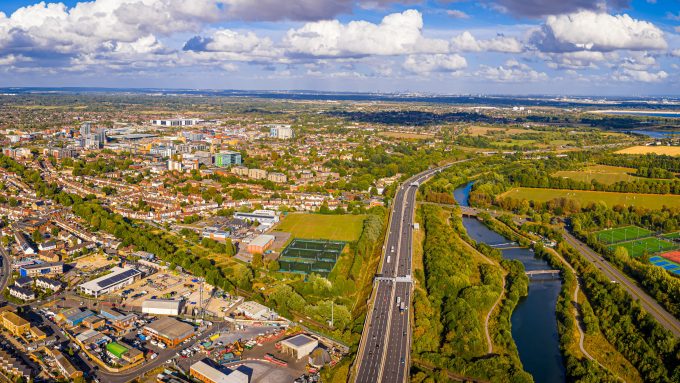
Meet the Innovator helping to reduce freight vehicle pollution in cities

Food, cleaning materials and furniture are among the contents of many of the 1000 trucks and vans arriving every month into the ground floor of one of the City of London’s tallest skyscrapers.
Above the heads of the delivery drivers and couriers coming and going from the small loading area are 6000 people employed by over 16 companies across 48 floors. Careful management of freight vehicles on behalf of the occupants is required, otherwise the loading bays and adjacent service road face potential gridlock – leading to fines for drivers and the risk of increased air pollution.
Few will be more acutely aware of traffic management issues in the area than Steve Whyman who was previously chief executive of a property management business looking after several sites in London. This experience gave him an insight into the challenges of urban freight and the potential to reduce vehicle movements using data and technology.
Steve and his team developed a prototype of what is now CurbCargo, a software system that manages vehicle arrivals and encourages more sustainable deliveries. They did so using £30,000 awarded from the Transport Research and Innovation Grants (TRIG) programme in 2022 – delivered by Connected Places Catapult on behalf of the Department for Transport (DfT).
Earlier this year, their start-up company won a further £120,000 in funding for a trial at scale through the Freight Innovation Fund Accelerator, which is also delivered by the Catapult for DfT.
“The building we are working with in the City of London is essentially a vertical village and most of what comes in and out goes through just the one loading area,” Steve explains from a viewing platform on the top floor. “The road outside is also tightly controlled, so there needs to be a well managed booking process for everyone to use.
“I kept in touch with people on site after I left, and they kindly agreed to host a trial of the CurbCargo platform which began in April,” he explains.
Data capture is key
CurbCargo is all about capturing data one delivery at a time, which Steve describes as “the building block” of the platform; providing insights into the environmental impact of deliveries for the property management team and each of the companies based in the building.
Every company in the building needing to receive a delivery or arrange a collection through the loading area makes a booking using CurbCargo, so that a vehicle’s arrival can be scheduled. The registration details of trucks and vans passing into the building are fed into the system to check whether the vehicles comply with environmental regulations, such as the Ultra Low Emission Zone. Emissions associated with a journey are also calculated using an algorithm developed in partnership with Imperial College Consultants.

Data is fed back to the businesses receiving deliveries to show the environmental impact of their orders. The software platform learns from this data and generates suggestions or ‘prompts’ for reducing the environmental impact of deliveries when the next bookings are made.
If two companies in the building order goods from one supplier to arrive on different days, the system will highlight this and ask those making the bookings if they could request the deliveries on the same day and in the one vehicle.
“The software will also ask why there is a need for certain products to be delivered five times a week rather than, say, two,” explains Steve. “Businesses can then alter their future ordering patterns and ‘curb’ their emissions and help reduce congestion.”
The system identifies if there are many suppliers of similar goods – such as caterers – arriving to the same address, and connects the businesses involved to identify opportunities for collaboration to reduce the number of suppliers across the whole building.
“Our focus is on reducing environmental impact, but working together in this way will save costs too,” he adds.
“The support from Connected Places Catapult has been fantastic and the TRIG grant allowed us to develop the concept and see whether the ‘prompts’ the system generates for users are meaningful and allow action to be taken. The answer was yes, so that gave us the confidence to apply for the Freight Innovation Fund Accelerator grant and start the trial, which has over 70 users in the building, plus more than 400 suppliers listed on the system.”
“Within a year, I hope to roll out the system to more sites in the City, and have ambitions to use it elsewhere in the country too.”
A varied career
Steve Whyman started his career as a research assistant investigating the most sustainable way to transport shellfish, having studied zoology at the University of Hull. He joined a supply chain logistics company, working to help develop a large supermarket distribution centre.
He went on to work for Exel Logistics and spent time in Europe and America, before being appointed supply chain director at Halfords to look after logistics and IT systems. He was part of a team that floated the retailer on the London Stock Exchange.
Steve and a co-founder developed a software company focused on health and safety compliance in the hospitality industry, before Steve received a call asking if he wanted to run property services company Broadgate Estates. He accepted and grew the business which was then sold to Savills eight years later. Steve has also been an investor in several technology start-up firms, and founded CurbCargo 18 months ago.
“Transport has always been in the blood; my Dad started his career as a lorry driver and went on to run a large parcel delivery firm,” he adds.
Steve was driven to set up CurbCargo because he has seen first hand the knotty problems of congestion and poor air quality associated with delivering freight in cities. “I spent a lot of my career working on lean supply chains and just-in-time deliveries, which can increase vehicle movements. But we need to rethink these models given the air quality and climate challenges we all face.
“Climate change is the challenge of our time and needs multiple solutions and interventions. I spent eight years managing properties in London, and thought about how things could be done differently using technology and big data to help reduce pollution and congestion.”
Steve describes himself as an “operational problem solver” and says he enjoys “finding new ways of addressing challenges” such as increasing urban freight movements through having access to better information.
Advice for other entrepreneurs
Steve says that setting up a company in the innovation space “is tough; it’s the fear of stepping into the unknown” but adds “it is not always as hard as you may think to make that first move”.
The key trait needed as an innovator is resilience, he adds. “You will have knockbacks and hear from people who say ‘no’ but when that happens, you just have to pick yourself up and go again.”
He advises other entrepreneurs “to be bold” and not to be overwhelmed by having to be “everyone from the salesperson, to the marketeer, to the product designer”.
Steve admits to “probably underestimating the complexity of handling all of the data early on” when setting up CurbCargo, and “the time needed to build awareness of this new way of working”.
Steve adds that a great outcome for the team would be to see CurbCargo deployed at scale, “making a genuine improvement in urban air quality and reducing congestion – in cities all over the world.”
Connected Places Catapult will host its first Freight Innovation Cluster Investor Day On 2 November at Manchester Art Gallery, part of the current Freight Innovation Fund programme.





